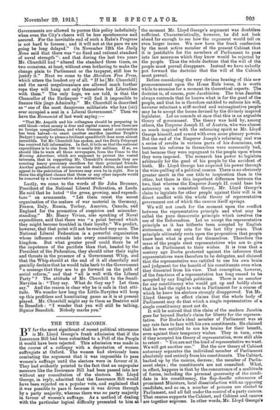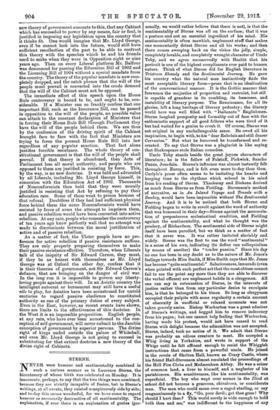THE TRUE JACOBIN.
BY far the most significant of recent political utterances is Mr. Lloyd George's frank admission that if the Insurance Bill had been submitted to a Poll of the People it would have been rejected. This admission was made in the course of a colloquy with a deputation of women suffragists at Oxford. The women had obviously been combating the argument that it was impossible to pass women's suffrage until the electors were in favour of it. They had evidently pointed to the fact that an unpopular measure like the Insurance Bill had been passed into law without any consultation of the electors. Mr. Lloyd George, in reply, admitted that the Insurance Bill would have been rejected on a popular vote, and explained that it was possible to pass it because it was driven through by a party majority, whereas there was no party majority in favour of women's suffrage. As a method of dealing with the particular logical difficulty presented to him at the moment Mr. Lloyd George's argument was doubtless sufficient. Characteristically, however, he did not look ahead far enough to see how the argument would tell on even larger issues. We now have the frank confession by the most active member of the present Cabinet that it is justifiable for the members of Parliament to pass into law measures which they know would be rejected by the people. Thus the whole doctrine that the will of the people must prevail disappears. Instead we have nakedly put forward the doctrine that the will of the Cabinet must prevail.
Before considering the very obvious bearing of this new pronouncement upon the Home Rule issue, it is worth while to examine for a moment its theoretical aspects. The doctrine is, of course, pure Jacobinism. The true Jacobin always contends that be knows what is for the good of the people, and that he is therefore entitled to enforce his will, however reluctant a stiff-necked and unimaginative people may be to accept the boons devised by the divinely inspired legislator. Let us concede at once that this is an arguable theory of government. The theory was held by, among others, the Emperor Joseph II. of Austria, who was almost as much inspired with the reforming spirit as Mr. Lloyd George himself, and armed with even more plenary powers. But the end of the Emperor Joseph's reforming zeal was a series of revolts in various parts of his dominions, not because his reforms in themselves were necessarily bad, but because they were repugnant to the people upon whom they were imposed. The monarch has power to legislate arbitrarily for the good of his people by the accident of birth. Mr. Lloyd George has acquired his power through the wire-pulling of a political caucus. There is no obviously greater merit in the one title to inspiration than in the other, but there is this important difference between the two, that whereas the Emperor Joseph II. could base his autocracy on a consistent theory, Mr. Lloyd George's claim to legislate for other people against their will is in direct conflict with the whole theory of representative government out of which the caucus itself springs.
We will not touch for the moment upon the conflict between the representative principle and what may be called the pure democratic principle which involves the use of the Referendum. Let us accept the representative principle as it has hitherto been accepted by English statesmen, at any rate for the last fifty years. That principle ultimately rests upon the proposition that people know best what is good for themselves. Therefore the mass of the people elect representatives who are to give effect in Parliament to their wishes. It is true that a century ago Burke protested against the inference that representatives were therefore to be delegates, and claimed that the representative was entitled to use his own brain and judgment for the benefit of his constituents even when they dissented from his view. That conception, however, of the functions of a representative has long ceased to be accepted by any English politician. There is no member for any constituency who would get up and boldly claim that he had the right to vote in Parliament for a course of which he knew his electors strongly disapproved. Yet Mr. Lloyd George in effect claims that the whole body of Parliament may do that which a single representative of a single constituency must not do. It will be noticed that this claim of the modern Jacobin goes far beyond Burke's claim for liberty for the represen- tative. For Burke's ideal member of Parliament was at any rate face to face with his own constituents. He claimed that he was entitled to use his brains for their benefit, even against their temporary wishes. They in turn, even if they accepted his theory of representation, were still able to retort : " You are not the kind of representative we want. We will get another one." But the new theory of Cabinet autocracy separates the individual member of Parliament absolutely and entirely from his constituents. The Cabinet, backed up by the caucus, decrees ; the member of Parlia- ment obeys ; the constituents are not consulted. What, in effect, happens is that by the concurrence of a multitude of forces, including the personal generosity of the candi- date in his constituency, the flap-doodle utterances of prominent Ministers, local dissatisfaction with an opposing candidate, and so on, a number of persons are elected to Parliament, and all fall under the control of a party caucus. That caucus supports the Cabinet, and Cabinet and caucus are together supreme. In other words, Mr. Lloyd George's
new theory of government, amounts to this, that any Cabinet which has succeeded to power by any means, fair or foul, is justified in imposing any legislation upon the country that it thinks fit. One would imagine that Mr. Lloyd George, even if he cannot look into the future, would still have sufficient recollection of the past to be able to contrast this theory with the speeches which ho and his friends used to make when they were in Opposition eight or nine years ago. Then on every Liberal platform Mr. Balfour was denounced for passing the Education Bill of 1902 and the Licensing Bill of 1904 without a special mandate from the country. The theory of the popular mandate is now com- pletely dropped, and the catch phrase that the will of the people must prevail is converted into the crude demand that the will of the Cabinet must not be opposed.
The immediate effect of this speech upon the Home Rule controversy is bound to be, and ought to be, con- siderable. If a Minister can so frankly confess that one important Bill, such as the Insurance Bill, can be passed in opposition to the will of the people, no possible value can attach to the constant declaration of Ministers that in forcing their Home Rule Bill through Parliament they have the will of the people behind them. We are thus by the confession of the driving spirit of the Cabinet brought face to face with the fact that Ministers are trying to force the present Home Rule Bill into law regardless of any popular sanction. That fact alone justifies forcible resistance. The whole theory of con- stitutional government is that the will of the people shall prevail. If that theory is abandoned, then Acts of Parliament lose all moral authority, and people who are opposed to them are justified in resisting by force. This, by the way, is no new doctrine. It was held and advocated by all Liberals, including Mr. Lloyd George himself, in connexion with the Education Act of 1902. Thousands of Nonconformists then held that they were morally justified in resisting that Act by refusing to pay their education rate. Some of them went to prison because of that refusal. Doubtless if they had had sufficient physical force behind them the same Nonconformists would have resisted by force of arms the attempt to imprison them, and passive rebellion would have been converted into active rebellion. At any rate, people who remember the controversy of ten years ago know perfectly well that no attempt was made to discriminate between the moral justification of active and of passive rebellion.
As a matter of fact, the Ulster people have no pre- ference for active rebellion if passive resistance suffices. They are only properly preparing themselves to make their passive resistance effective. Therefore, when Liberals talk of the iniquity of Sir Edward Carson, they must, if they be as honest with themselves as Mr. Lloyd George was at Oxford the other day, confess that it is their theories of government, not Sir Edward Carson's defiance, that are bringing on the danger of civil war. In the long run it is impossible to govern any liberty- loving people against their will. In an Asiatic country the intelligent autocrat or bureaucrat may still have a useful role to play, for Asiatics have been accustomed for untold centuries to regard passive obedience to constituted authority as one of the primary duties of every subject. Even in the East, however, as recent events have shown, there are limits to the effectiveness of this doctrine. In the West it is an impossible proposition. English people, at any rate, who have ever been accustomed to the con- ception of self-government, will never submit to the Jacobin conception of government by superior persons. The divine right of kings ended outside the palace of Whitehall, and even Mr. Lloyd George is not going to succeed in substituting for that extinct doctrine a new theory of the divine right of Cabinets.



















































 Previous page
Previous page